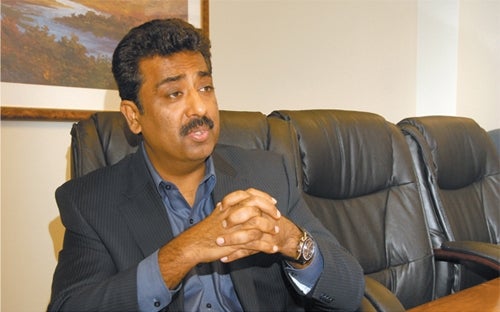Girish Kumar Navani didn’t exactly plan on starting an electronic medical records company.
When he came to the U.S. from India in 1988 to study towards a master’s in engineering at Boston University he wanted to “do something significant.”
But it was not until the mid 1990s when he was in Geneva at a conference on the use of wireless technology in health care that the idea hit him.
“Health care is still on paper?” Navani remembers thinking. “That’s a golden opportunity. We took that opportunity and ran with it.”
Now, Navani’s company, eClinicalWorks in Westborough, serves more than 30,000 physician practices all over the country with more than 100,000 users in all 50 states. 2008 revenues topped $85 million, up from $4 million in 2004.
Navani, this year’s Worcester Business Journal Big Business Leader of the Year, said it comes down to a simple formula that has worked since the day he started the company: customer service, price and functionality.
“If you look at the sales model, it’s about word of mouth,” Navani said. “We have one customer that tells five others, and 100 customers telling 500 others. It works great. Sometimes I don’t even believe it myself.”
Tough Choices
Navani said it wasn’t always that easy.
“The first 100 customers is the hardest,” he said. “It takes perseverance.”
The executive team at eClincialWorks has so far resisted taking any venture capital funding or going public. But that choice to remain independent has made the company stronger, he argues. eClinicalWorks’ independence from fililng quarterly earnings statements has allowed the company to focus on its products and customers, Navani says.
Talk to someone that knows Navani and they’ll tell you another secret to the company.
“He’s an unbelievable salesman,” said Micky Tripathi, CEO of the Massachusetts eHealth Collaborative. “He himself used to do the demoing of the product. He would come in alone, do a session, answer technical questions, business questions, anything. He was just incredibly good at selling the products. A big reason this company is here is because of that man.”
Tripathi’s nonprofit collaboration works with health care and insurance providers as well as EMR companies to expand electronic medical record offerings around the state. He also has a for-profit consulting firm that provides technical assistance and preparation for EMR transitions.
eClinicalWorks’ market audience also has allowed the company to grow rapidly, Tripathi said. Navani targeted small physician practices instead of the larger hospitals. That gave eClinicalWorks an almost unlimited customer supply base with the thousands of physician practices in the country.
Now, the company has grown to not only include those small practices, but some of the largest hospitals, too. Navani said Children’s Hospital, Mt. Auburn Hospital and Beth Israel Deconess Medical Center are all eClinicalWorks customers.
“We have a saying in the company…We do big things for big customers, big things for small customers, but we do small things for all our customers,” Navani said.
And Navani said there is still a ways to go.
Untapped Market
Navani estimates that less than 25 percent of the market for EMRs has been tapped. An estimated 80 percent of practices in the country have less than five doctors, the majority of which have not yet adopted EMR technology.
The government is helping to accelerate adoption, too. The 2009 American Recovery and Reinvestment Act included more than $30 billion in Medicare and Medicaid incentives for practices to implement EMR technology.
“eClinicalworks has been able to get physicians on their own to purchase the system. Now that the government is going to give money to physicians, I think it will only help and speed up the process,” Tripathi said.
But Tripathi said there is still hesitation among some small practices to implement the technology. Some doctors want to wait for the technology to continue to develop or are concerned about the upfront cost.
Navani, however, continues to adjust his company for the future. He said he spent 2009 preparing his company, from the inside, for continued growth.
In March, he announced the company would add 500 jobs in two years. He said they are on pace to add even more.
Navani said the bottom line of an income statement is just one benchmark that he looks at.
The bigger ones are success stories of doctors using the product and telling other doctors about it.
His dream is to not only make the lives and jobs of doctors and patients easier, but to improve the quality of care.
For example, when Framingham Pediatrics received a limited supply of H1N1 flu shots this year that had to be distributed to high-risk patients with preexisting conditions, the practice used eClinicalWorks software to find those patients. In a few moments data lists were compiled, e-mails were sent to parents of patients and the next day the practice began delivering the shots to the children.
Framingham Pediatrics doctor Andrew Baumel said the product has been indispensible to his practice.
He can access all 1,500 of his patient records from anywhere he has Internet access, making him more effective while on call.
He can file prescriptions electronically, and the computer system remembers how he has treated past diagnoses.
For all the success eClinicalWorks has had, that doesn’t mean Navani doesn’t hear criticisms.
Navani said he meets with customers, online or in person, as often as possible.
“It takes guts,” he said. “It’s not easy to stand there and have someone point out all your weaknesses.”
Navani said he’s proud of his product, but it’s still not perfect. That’s why he continues to innovate.
And it’s normal, he said, for technology companies to have glitches along the way.
Think of Windows 3.0 when it launched in 1990 compared to the new Windows 7 that was recently released, he said.
“Give us 20 years and we’ll change the world, too,” Navani said.

